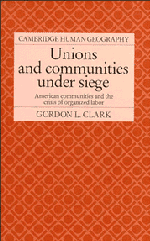Book contents
- Frontmatter
- Contents
- List of tables
- Preface
- Acknowledgments
- PART I ECONOMY AND COMMUNITY
- PART II DRAMA OF ECONOMIC RESTRUCTURING
- PART III UNION PERFORMANCE IN REPRESENTATION ELECTIONS
- 5 Democracy in the guise of representation elections
- 6 Organizing strategies in the heartland and the South
- 7 At the margin of the rules of the game
- PART IV REGULATING LOCAL LABOR–MANAGEMENT RELATIONS
- PART V PROSPECTS FOR ORGANIZED LABOR
- Appendix 1 Variables and data sources
- Appendix 2 Cases cited
- Notes
- Bibliography
- Name index
- Subject index
7 - At the margin of the rules of the game
Published online by Cambridge University Press: 13 October 2009
- Frontmatter
- Contents
- List of tables
- Preface
- Acknowledgments
- PART I ECONOMY AND COMMUNITY
- PART II DRAMA OF ECONOMIC RESTRUCTURING
- PART III UNION PERFORMANCE IN REPRESENTATION ELECTIONS
- 5 Democracy in the guise of representation elections
- 6 Organizing strategies in the heartland and the South
- 7 At the margin of the rules of the game
- PART IV REGULATING LOCAL LABOR–MANAGEMENT RELATIONS
- PART V PROSPECTS FOR ORGANIZED LABOR
- Appendix 1 Variables and data sources
- Appendix 2 Cases cited
- Notes
- Bibliography
- Name index
- Subject index
Summary
In a recent decision, a panel of the National Labor Relations Board set aside a narrow union victory in a representation election involving the Retail, Wholesale and Department Store Union Local 1034 and the Bristol Textile Company. During an acrimonious election campaign two employees were overheard saying that they would slash the tires of employees who opposed the union. The union won the election by a 15–12 vote, with two ballots challenged. The company filed an objection with the NLRB claiming that the threat to slash tires so affected the atmosphere of the election that a second election was warranted. On appeal, the NLRB panel held that the threat was “plainly coercive.” Because of the closeness of the margin of victory, and the fact that at least seven voters were aware of the threat before the election, the panel ordered a new election.
In another case, this time involving the United Food and Commercial Workers and a supermarket chain, the Board ordered a new election because a management consultant “unlawfully interrogated” employees about their prior union experience just before the election. In this instance, the union lost by a vote of 27–51 and appealed to the Board claiming (in part) that the management consultant's questions had a coercive affect on employees. Chairman Dotson dissented from the majority opinion, arguing that the interrogation was an isolated event, which would have had no effect on the outcome of the election.
- Type
- Chapter
- Information
- Unions and Communities under SiegeAmerican Communities and the Crisis of Organized Labor, pp. 130 - 148Publisher: Cambridge University PressPrint publication year: 1989

